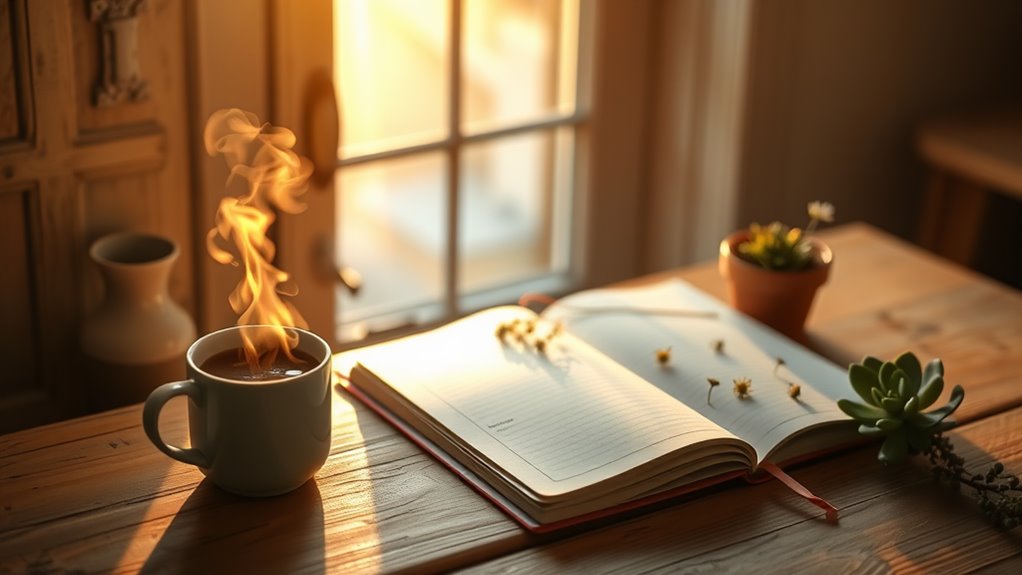My Go-To Stress Relief Routine After a Long Day
You might think a stress relief routine demands too much time, but even brief steps like deep breathing can quickly ease your tension. As you explore these evidence-based practices, you’ll uncover how they build calm and prepare you for a restorative night.
Key Takeaways
- Practice deep breathing exercises, like the 4-7-8 method, to quickly calm your mind and reduce anxiety.
- Perform gentle stretches and enjoy a warm bath to release muscle tension and promote relaxation.
- Sip herbal tea, such as chamomile, to hydrate and soothe your nerves after a busy day.
- Listen to calming music, like ambient tracks, to lower stress and foster mindfulness.
- Journal your daily stresses to reflect on emotions and build resilience for better rest.
Deep Breathing Exercises
When stress builds up and leaves you feeling overwhelmed, deep breathing exercises offer a simple, effective way to calm your mind and body.
In your stress relief routine, you start by finding a quiet spot and sitting comfortably.
Try the 4-7-8 method: inhale deeply through your nose for four counts, hold for seven, then exhale slowly through your mouth for eight.
Research, like studies from Harvard Health, confirms that this technique lowers heart rate and reduces anxiety, giving you quick relief without any equipment.
Practice it daily to build resilience against daily pressures.
This technique is one of the mindfulness habits that can help incorporate practical tips for enhanced mental clarity and emotional balance into your routine.
Gentle Physical Stretches
After your deep breathing exercises, gentle physical stretches ease muscle tension and promote relaxation.
You’ll find that simple moves, like a seated forward bend or shoulder rolls, target tight areas effectively. Research from the American Council on Exercise indicates stretching lowers cortisol and enhances flexibility, aiding recovery from daily stress.
Gently hold each stretch for 20-30 seconds, breathing deeply to amplify benefits. This evidence-based approach fosters a sense of calm without overexertion, making it ideal for unwinding.
Prioritize what feels right for your body to build a sustainable habit.
By following this routine, you can effectively unwind and recharge after a long day.
Mindfulness Meditation Techniques
As you navigate daily stressors, you’ll find that mindfulness meditation techniques like the breathing awareness exercise offer a simple way to center yourself.
These methods, including body scan meditation and mindful observation practice, help you tune into the present moment and reduce tension effectively.
Studies confirm that incorporating these practices into your routine can lower stress levels based on reliable evidence from mindfulness research.
Moreover, dedicating 10 minutes a day to mindfulness can profoundly transform your life and enhance overall mental well-being.
Breathing Awareness Exercise
One effective way to ease stress is through the breathing awareness exercise, a key mindfulness technique that helps you ground yourself in the present moment. Studies show it lowers anxiety by activating the parasympathetic nervous system; simply sit comfortably, close your eyes, and observe your breath without judgment. This evidence-based approach fosters calm and clarity.
| Step | Description | Benefit |
|---|---|---|
| 1 | Find a quiet spot and sit | Reduces immediate tension |
| 2 | Inhale deeply through your nose | Enhances focus and relaxation |
| 3 | Exhale slowly and observe | Promotes emotional stability |
Incorporate this routine to build resilience against daily stressors.
Body Scan Meditation
Building on the breathing awareness exercise, you can try body scan meditation to gently scan your body for areas of tension, fostering deeper relaxation.
Find a quiet spot and lie down comfortably. Start at your toes, noticing sensations like warmth or tightness, then gradually move up to your ankles, legs, torso, arms, and head.
As you identify tension, breathe into it and release it without judgment. Evidence from studies, such as those by the American Psychological Association, shows this practice reduces stress and improves sleep quality.
You’re giving yourself the compassionate space to heal and unwind.
Mindful Observation Practice
Mindful observation practice lets you engage fully with your surroundings, fostering a sense of calm by noticing details without getting caught in judgments.
Backed by studies from the American Psychological Association, it’s an evidence-based way to ease stress and enhance focus.
-
Choose a focus: Pick an object, like a leaf, and observe its colors and textures without analysis.
-
Notice sensations: Feel the air on your skin or sounds around you, acknowledging them neutrally.
-
Avoid judgments: Let thoughts arise and pass like clouds, maintaining gentle awareness.
-
Extend the practice: Gradually increase time, noting how it reduces anxiety over days.
This simple routine builds resilience, helping you unwind effectively.
Soothing Warm Bath Ritual
A warm bath serves as a timeless ritual for easing stress, allowing you to immerse yourself in comforting water that gently soothes tense muscles and calms the mind.
Research indicates that warm water boosts endorphin release, reducing cortisol levels and promoting relaxation.
You’ll find that dimming the lights and adding Epsom salts enhances this effect, easing physical tension while fostering mindfulness.
As you soak, focus on your breath, letting worries dissolve—it’s a simple, effective way to recharge.
This practice supports overall well-being, offering a moment of self-care you truly deserve.
To further enhance your relaxation routine, consider adding a foot soak for targeted relief on tired feet, drawing from simple DIY methods with soothing ingredients.
Herbal Tea and Hydration Break
While you’re unwinding from daily pressures, brewing a cup of herbal tea provides an easy way to hydrate and ease tension. Research indicates that teas like chamomile reduce anxiety by promoting relaxation and improving sleep quality, offering a gentle, natural boost to your well-being.
-
Choose your tea wisely: Opt for caffeine-free options like peppermint or lavender, backed by studies showing their calming effects.
-
Prepare mindfully: Heat water to the right temperature and steep for 5-10 minutes to maximize antioxidants and flavors.
-
Sip slowly: Take deliberate breaths while drinking, enhancing mindfulness and stress reduction.
-
Monitor hydration: Aim for 2-3 cups daily, as evidence links proper fluid intake to better mood and cognitive function.
Moreover, certain herbal teas can support hormonal balance by incorporating ingredients that promote overall wellness.
Engaging in a Favorite Hobby
Engaging in a favorite hobby offers a powerful way to unwind, as it shifts your focus from daily pressures to joyful activities.
Research from the American Psychological Association indicates that hobbies like gardening or reading can lower cortisol levels by up to 20%, fostering relaxation and emotional balance.
You immerse yourself fully, engaging your senses and promoting mindfulness without external distractions.
This evidence-based practice builds resilience, helping you process stress objectively.
By embracing daily rituals, you can further enhance a sense of peace and grounding in your everyday life.
Calming Music Listening Session
Listening to calming music serves as another effective stress reliever, much like your favorite hobbies. Evidence from studies shows it reduces cortisol levels and slows heart rate, helping you unwind objectively and feel more centered after a demanding day.
-
Select soothing tracks: Pick genres like ambient or classical that resonate with you, based on research linking them to lower stress.
-
Set up your space: Find a quiet, comfortable area to minimize distractions, enhancing music’s calming effects.
-
Start listening actively: Put on headphones and focus on the sounds, allowing them to draw you in and ease tension.
-
Monitor your response: Notice how it shifts your breathing and mood, promoting relaxation without overwhelming effort.
Just as meditation techniques can help reset the mind during hectic weeks, incorporating calming music into your routine offers a complementary way to restore balance.
Journaling for Reflection
Journaling offers a straightforward way to process daily stresses and foster self-awareness. As you write about your experiences, you’re engaging a technique backed by research, like studies in the British Journal of Health Psychology, which show it reduces cortisol and enhances emotional regulation.
You jot down thoughts freely, identifying triggers and patterns without judgment. This practice empowers you to reframe challenges, building resilience over time.
You’re not alone in this; many find that even five minutes daily brings clarity, helping you unwind and prepare for rest with a calmer mind.
Pairing this evening reflection with morning journaling can create a full-circle routine that boosts overall emotional well-being.





